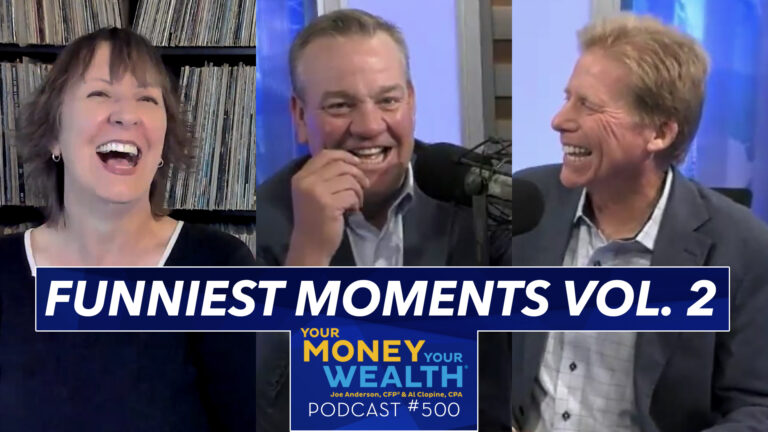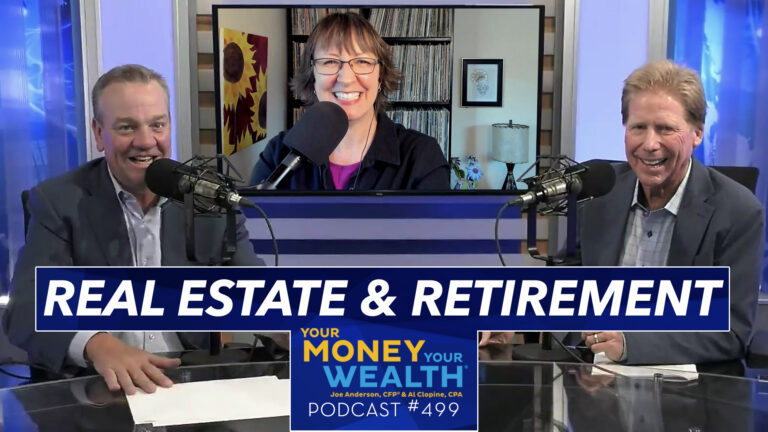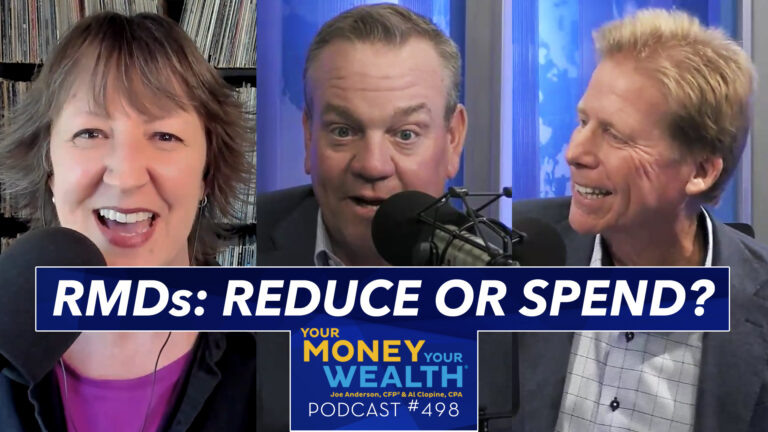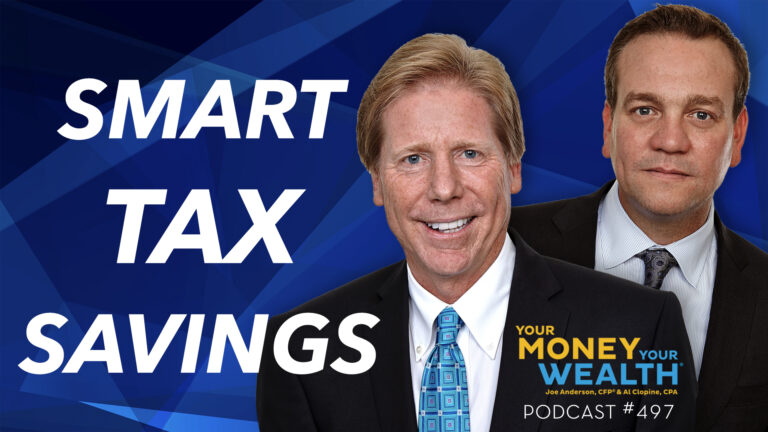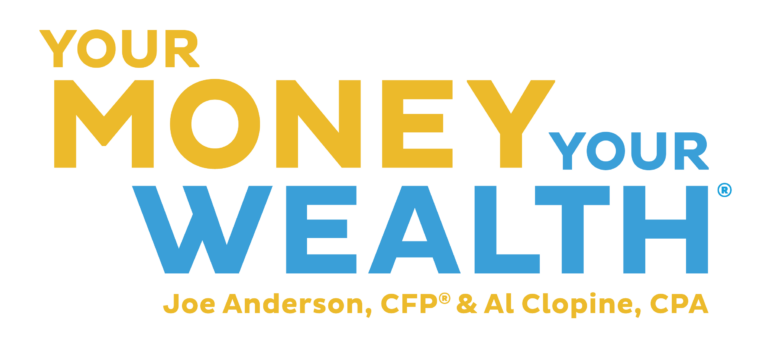Joe Anderson, CFP® and Alan Clopine, CPA interview Tom Anderson, author of The Value of Debt in Retirement, to discuss why debt isn’t always a bad thing in retirement. The Value of Debt placed #2 on Forbes List of Personal Finance Books Financial Experts Say Will Change Your Life. Plus, Joe and Al answer more email questions on-air. Original publish date January 21, 2017 (hour 2). Note that content may be outdated as rules and regulations have changed.
0:58 “We’re answering email questions as well, and this is fitting for our next segment.”
1:03 “I have a large 401(k) plus a pension. I want to retire before the end of 2017. I will be 62 years old in September. Would it be wise to pay off my car loan so I don’t have any debt when I retire? Should I withdraw from my 401(k) to do this?”
2:56 “Maybe this will work for you…I would look at my income over the next eight, nine months and try to budget extra payments so that by the tenth month I can have it all paid off with my salary.”
3:35 “A lot of people go into retirement thinking they have to have their mortgage paid off; that’s not necessarily true.”
6:28 Start of Interview with Tom Anderson
Joe (7:11) “Tom, let’s talk first of all about the title [of your book], ‘The Value of Debt in Retirement’ – when you think of most financial pundits, that’s the opposite take of what you might hear when you approach retirement.”
Tom (7:27) “That’s the general plan, is people are saying they need to rush in and get rid of all their debt before they retire – so we went with a more controversial title…we tried to put the math around it and explore that topic.”
Joe (7:57) “Most individuals, as they approach retirement, don’t necessarily take a look at both sides of the balance sheet. They might focus on the debt side a little too much where they pay extra on their mortgage payments and they have very little liquid capital to provide any type of retirement income, and they might think that will be a safer route approaching retirement where in actuality that might be the opposite thing they should be doing.”
Tom (8:25) “That’s exactly right…what happens is a lot of people find that they don’t have enough retirement savings…while many people feel they’ve under-saved for retirement, what they’re doing is they’re rushing in to pay off their debt, and they’re finding that they don’t have the liquidity or flexibility or the resources to put them on track for retirement.”
9:03 “Your listeners have to know that I don’t think all debt is good.”
Joe (9:37) “Right, it’s figuring out what is good debt and what is bad debt. I think people just lump debt into one category and say ‘no, it’s all bad – I want to be debt-free’ and then all of a sudden when they get into retirement they may have a paid off house but they have very little liquid assets and don’t have the retirement income they need long-term.”
Tom (10:09) “I would love for everybody to be able to pay off their house, but what happens is when you’re getting close to retirement, until you have enough money to pay off all of your house, I suggest why pay off any of it, because it’s a one-way liquidity trap.”
10:34 “What readers need to be thinking about is how to protect the liquidity and flexibility and make sure there are enough resources; [consider] working with an advisor…”
Joe (10:55) “What are the right types of debt?”
Tom (10:58) “Any debt that has a rate of return or a cost of it less than what you think you’re going to earn long-term in your portfolio…”
Joe (11:47) “Are there certain ratios that you take a look at?”
Tom (12:00) “When you retire, you basically have a pod of money that you’re trying to create an income stream from in retirement…there’s no clear math-compelling case that debt will add value. If you need to have between a 4% or 6% distribution rate – let’s say I have $1 million and I want to spend $50,000 a year, then I show that a 30% debt to asset ratio actually can add value. Those people have to take risk either through investing in risky assets or debt…some debt, the right kinds of debt, the right way, can actually reduce that risk.”
13:40 “It is a mathematical fact that debt can increase the rate of return in your portfolio. It is a mathematical fact that debt can reduce taxes; it is a mathematical fact that counterintuitively debt can reduce risk…it is a fact that this is not a guaranteed path and that you’re basically choosing between two different risks.”
18:36 End of Interview with Tom Anderson
19:34 “It’s not the end of the world to have a mortgage these days, particularly because interest rates are low, and this is what we call good debt because your home should continue to appreciate.”
24:54 “Which retirement account should we set up for our children? We would like to set-up accounts for our three kids, who are young adults. We are not sure if it is smart to make them wait until they are 59 1/2 years old. Would you recommend we set up a Roth IRA or a low cost index fund?”
26:45 “With a Roth contribution, the kids can always pull the money out – I would have them put it in a Roth IRA.”
Listen to the YMYW podcast:

Amazon Music
AntennaPod
Anytime Player
Apple Podcasts
Audible
Castbox
Castro
Curiocaster
Fountain
Goodpods
iHeartRadio
iVoox
Luminary
Overcast
Player FM
Pocket Casts
Podbean
Podcast Addict
Podcast Index
Podcast Guru
Podcast Republic
Podchaser
Podfriend
PodHero

Podknife
podStation
Podverse
Podvine
Radio Public
Rephonic
Sonnet
Spotify
Subscribe on Android
Subscribe by Email
RSS feed
IMPORTANT DISCLOSURES:
Pure Financial Advisors is a registered investment advisor. This show does not intend to provide personalized investment advice through this broadcast and does not represent that the securities or services discussed are suitable for any investor. Investors are advised not to rely on any information contained in the broadcast in the process of making a full and informed investment decision.
• Investment Advisory and Financial Planning Services are offered through Pure Financial Advisors, LLC, a Registered Investment Advisor.
• Pure Financial Advisors LLC does not offer tax or legal advice. Consult with your tax advisor or attorney regarding specific situations.
• Opinions expressed are not intended as investment advice or to predict future performance.
• Past performance does not guarantee future results.
• Investing involves risk including the potential loss of principal. No investment strategy can guarantee a profit or protect against loss in periods of declining values.
• All information is believed to be from reliable sources; however, we make no representation as to its completeness or accuracy. As rules and regulations change, content may become outdated.
• Intended for educational purposes only and are not intended as individualized advice or a guarantee that you will achieve a desired result. Before implementing any strategies discussed you should consult your tax and financial advisors.
CFP® – The CERTIFIED FINANCIAL PLANNER™ certification is by the Certified Financial Planner Board of Standards, Inc. To attain the right to use the CFP® designation, an individual must satisfactorily fulfill education, experience and ethics requirements as well as pass a comprehensive exam. Thirty hours of continuing education is required every two years to maintain the designation.
AIF® – Accredited Investment Fiduciary designation is administered by the Center for Fiduciary Studies fi360. To receive the AIF Designation, an individual must meet prerequisite criteria, complete a training program, and pass a comprehensive examination. Six hours of continuing education is required annually to maintain the designation.
CPA – Certified Public Accountant is a license set by the American Institute of Certified Public Accountants and administered by the National Association of State Boards of Accountancy. Eligibility to sit for the Uniform CPA Exam is determined by individual State Boards of Accountancy. Typically, the requirement is a U.S. bachelor’s degree which includes a minimum number of qualifying credit hours in accounting and business administration with an additional one-year study. All CPA candidates must pass the Uniform CPA Examination to qualify for a CPA certificate and license (i.e., permit to practice) to practice public accounting. CPAs are required to take continuing education courses to renew their license, and most states require CPAs to complete an ethics course during every renewal period.



